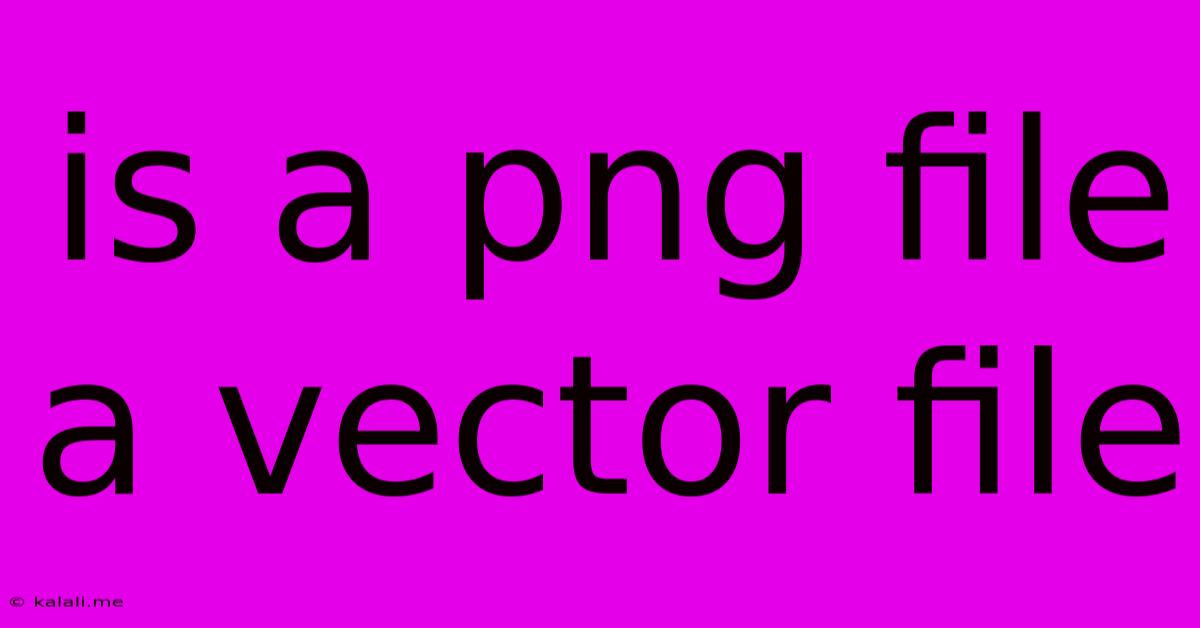Is A Png File A Vector File
Kalali
Jun 08, 2025 · 3 min read

Table of Contents
Is a PNG File a Vector File? A Deep Dive into Image Formats
Meta Description: Understanding the difference between raster and vector images is crucial for designers and web developers. This article clarifies whether PNGs are vector files and explores the key characteristics of each image type.
Many beginners in graphic design and web development often confuse raster and vector image formats. A common question arises: is a PNG file a vector file? The short answer is no. PNG (Portable Network Graphics) is a raster image format, fundamentally different from vector formats like SVG or AI. Let's delve deeper into the distinctions between these two image types and understand why PNGs aren't considered vectors.
Understanding Raster Images (like PNG)
Raster images, such as PNG, JPEG, GIF, and TIFF, are composed of a grid of pixels. Each pixel is assigned a specific color, and the image's overall appearance is determined by the arrangement and color of these individual pixels. Think of it like a mosaic – many tiny pieces forming a larger picture.
Here's what characterizes raster images like PNG:
- Resolution Dependent: The quality of a raster image degrades when scaled up (enlarged). Increasing the size stretches the pixels, making the image appear blurry or pixelated.
- File Size: Can be large, especially for high-resolution images. The file size is directly related to the number of pixels.
- Editing Limitations: Precise editing, like changing individual elements without affecting the entire image, can be challenging.
- Suitable for: Photographs, scanned images, and artwork with complex details where subtle color gradients are important.
Understanding Vector Images
Vector images, on the other hand, are defined by mathematical equations that describe lines, curves, and shapes. They are not made up of pixels. This means they can be scaled to any size without losing quality.
Key characteristics of vector images include:
- Resolution Independent: They can be scaled infinitely without losing sharpness.
- Smaller File Sizes: Generally smaller than raster images of comparable complexity.
- Easy Editing: Individual elements within the image can be easily modified and manipulated.
- Suitable for: Logos, illustrations, typography, and designs that require sharp lines and clean scaling across various sizes. Think of your favorite brand logo – it likely uses a vector format.
PNG vs. Vector: The Key Differences Summarized
| Feature | PNG (Raster) | Vector (e.g., SVG, AI) |
|---|---|---|
| Image Type | Pixel-based | Mathematical equations |
| Resolution | Resolution dependent | Resolution independent |
| Scalability | Pixelation at larger sizes | Scales without quality loss |
| File Size | Can be large | Generally smaller |
| Editing | Difficult to edit precisely | Easy to edit individual elements |
| Best Use Cases | Photographs, complex artwork | Logos, illustrations, typography |
Why You Shouldn't Use PNG for Scalable Graphics
While PNG offers lossless compression (meaning no data is lost during compression), its raster nature limits its suitability for applications requiring scalability. Using a PNG for a logo that needs to appear crisp on a website banner, business card, and billboard will result in a blurry, pixelated mess on the larger formats. For such instances, a vector format is the optimal choice.
In Conclusion
A PNG file is definitively not a vector file. Understanding the core differences between raster (like PNG) and vector image formats is essential for creating high-quality visuals and choosing the appropriate format for your specific project. Choosing the right image type ensures your designs look their best across various applications and resolutions.
Latest Posts
Latest Posts
-
Should You Double Seal Vacuum Bags
Jun 08, 2025
-
How To Remove Gasoline Smell From Hands
Jun 08, 2025
-
How To Find Limits On A Graph
Jun 08, 2025
-
Write An Equation For The Function Graphed Below
Jun 08, 2025
-
How To Get Treasure Maps Rdr2 Online
Jun 08, 2025
Related Post
Thank you for visiting our website which covers about Is A Png File A Vector File . We hope the information provided has been useful to you. Feel free to contact us if you have any questions or need further assistance. See you next time and don't miss to bookmark.